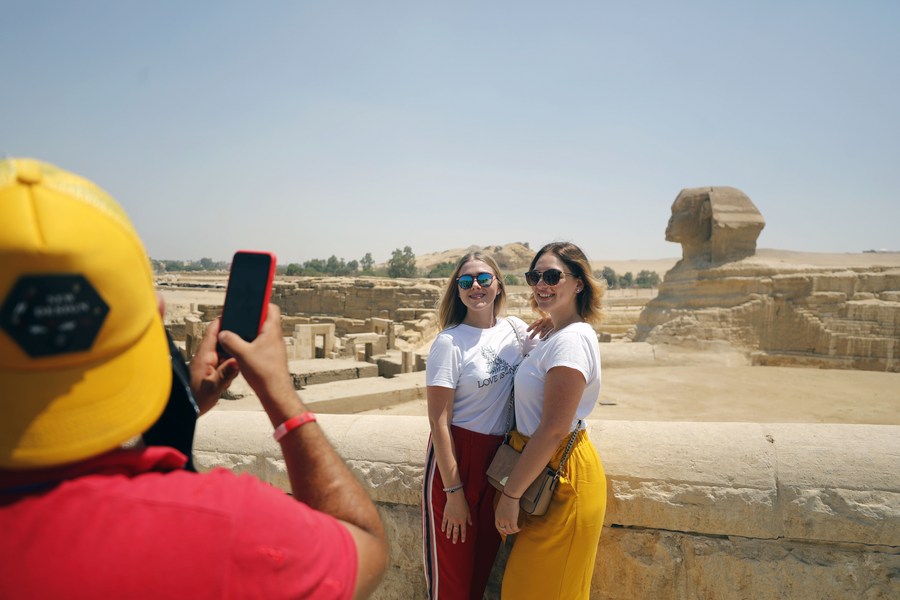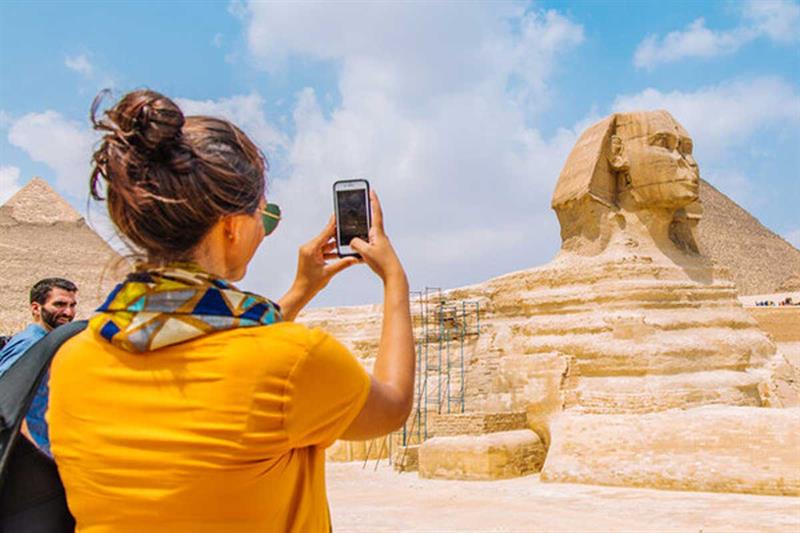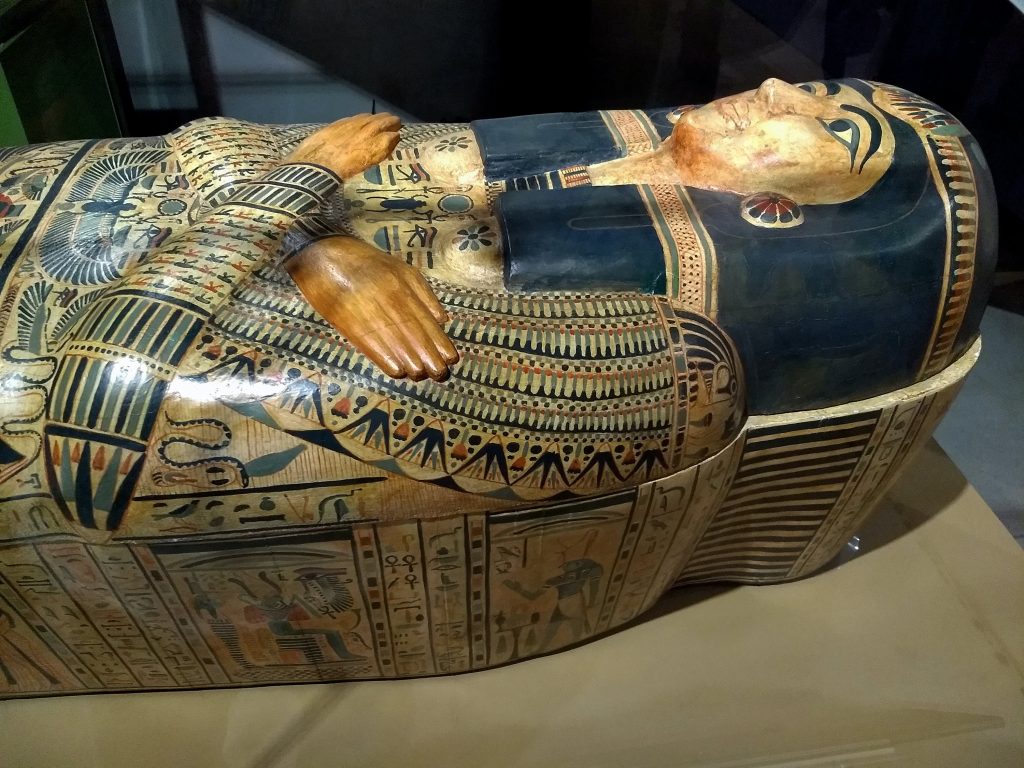One outcome of China’s urban household disposable income per capita increasing by 480% from 2003 to 2023, as per data aggregator Trading Economics, is that more Chinese than ever can afford to travel abroad. A 2018 note from Fliggy, an online travel agency owned by Chinese tech giant Alibaba Group, said, “The wealthy, the middle class, the young, the old — everyone is heading abroad.”
In 2019, just before COVID-19 lockdowns, “Mainland China had the largest outbound travel market in the world, both in number of trips and total spent,” said Guang Chen, a partner at McKinsey & Company’s Hong Kong Office, in research published in May.
Egypt never really captured that booming segment. According to CBE, in 2018, Chinese leisure tourists accounted for just over 2% of total visitors that year. Sherifa Issa, Four Season Egypt Director of Sales and Marketing, says “the percentage of Chinese business for us is quite small [despite seeing an increase year over year.”
To capitalize, local tourism companies need to meet Chinese tourists’ expectations. Research from Chinese marketing firm YIVA published in May on LinkedIn said, “In this … stage of China’s tourism market recovery, it is important to identify the market demand earlier and [align] with the … trends.”
Establishing rapport
Trifon Tsvetkov, head of content at EU-based online tour booking company Regiondo, said Chinese tourists want to connect to destinations even if they have never visited them. “Chinese tourists love storytelling,” he wrote in a March blog. “Do some background research on what is known in China about your product in general.”
That includes finding relationships between the product on offer and Chinese society and culture. “Did the scenery of your destination appear in a Chinese movie or … was it described in a poem, like the Cambridge King’s College willow in Xu Zhimo’s poem?” Tsvetkov said. “These pieces of information can make a difference to help Chinese tourists create a close relationship to [the] product as well as pay more attention … during the tour.”
Another important step is to have content written in Mandarin. An April report by the Chinese Marketing Agency (GMA) said tourism companies should have a version of their website and marketing content translated. “This will help potential customers find your business online and feel more comfortable with you.”
An extra step would be to hire someone who speaks Mandarin to communicate with the tour group. “It’s all about … acknowledging the importance of Chinese travelers,” said Tsvetkov.
To facilitate that step, the GMA recommends tourism companies partner with Chinese travel agencies, websites, and social media platforms like WeChat or Weibo. The report also suggests working with travel influencers to promote the destination.
Tourism companies also should understand Chinese values. “You can tell that fast and diligent are two words that describe how everyday life [in China] works,” said Tsvetkov. “This mentality is also expected when buying and receiving tourism services.”
Travel companies should streamline booking processes and respond quickly. Tsvetkov noted, “Forget about 9-5 schedules and be prepared to respond 24-7.”

Know-your-tourist
Accounting for 18.5% of the world’s population, according to data aggregator Worldometer, plenty of Chinese from diverse walks of life travel every year. Each has preferences and expectations.
The May McKinsey report expects a significant portion of Chinese travelers who are approaching or just crossed the age of 60. “They have been working … for a long time and are curious about the world beyond their familiar surroundings,” noted Chen of McKinsey. Additionally, they have “stable dis- posable incomes through pensions and low expenses … mobility, [and] willingness to travel abroad.”
The report added those senior travelers “may feel more dependent on travel agencies [given their] physical decline.” They likely will travel outside “peak seasons such as Golden Week Holiday and summer/winter vacations.”
Chinese millennials (born between 1981 and 1996) and Gen Z (born from the late 1990s to early 2010s) also are traveling to foreign destinations as their disposable incomes increase. A report from Dragon Trail’s 2022 Consumer Sentiment said the young generation of Chinese “seek local experiences, [particularly] local foods and want to experience local life … over package sightseeing tours with large groups, which appeals mainly to rural and older generations of Chinese.”
A note from the Australian government said experiences young Chinese travelers seek include skiing, sailing, event-filled cruises, national parks, botanical gardens, heritage buildings, landmarks, and social events. They usually travel during their country’s official holidays, as they hold jobs.
Regardless of age, Tsvetkov stressed that Chinese travelers prioritize value for money. “Deal hunting is a national sport … especially those newcomers, [where] prices play a more important role than the experiences per se.” He added that offers and discounts are generally more effective if they align with Chinese national holidays.
Shopping is another priority. “China is the largest source of duty-free consumption in Asia- Pacific [in] quantity and scale,” according to YIVA’s research. Chen of McKinsey noted department store shopping comes in second, adding that both account for about half of those travelers’ “cash outlay.”
The Australian government said they usually buy “luxury brands that may be unavailable or cost more in China due to tariff and consumption taxes.” McKinsey’s report singled out “clothing, handbags and beauty products [as] the most popular categories.”

Digital interface
Chinese tourists generally want to manage and make decisions about their vacations from their smartphones. “Over 98% of Chinese internet users access the internet via mobile devices,” said the GMA. “Online platforms play a significant role in shaping … decisions.”
Companies catering to the Chinese should be aware of online reviews as they will almost certainly determine whether a Chinese tourist visits a particular destination. “Social media plays a significant role in shaping travel decisions among Chinese tourists,” GMA’s research stressed. Tourism companies should be on multiple Chinese platforms that are equivalent to Facebook, Instagram, and Twitter.
Another critical factor is whether the destination country accepts Chinese cards. It also needs to allow Chinese apps to make local reservations, display domestic products, and be updated with relevant information and offers. “About 65% of Chinese tourists have used mobile payments while traveling abroad,” said the GMA. Of those, “91% are willing to spend more if overseas merchants accept Chinese mobile payment platforms like Alipay.”
The influence of China on the global tourism market will only grow in the foreseeable future. After dropping 86.4% and 83.4% in 2020 and 2021 versus 2019 due to COVID-19 lockdowns, Julia Simpson, World Travel Tourism Council president and CEO, told CNBC in May that Chinese tourism “in 2024 would exceed 2019.”
Issa of Four Seasons is optimistic Egypt could capitalize on that growth. “I see the trend will continue to increase, especially with the government’s focus on this market and the hotel’s commitment to put resources towards attracting more business from China.”







